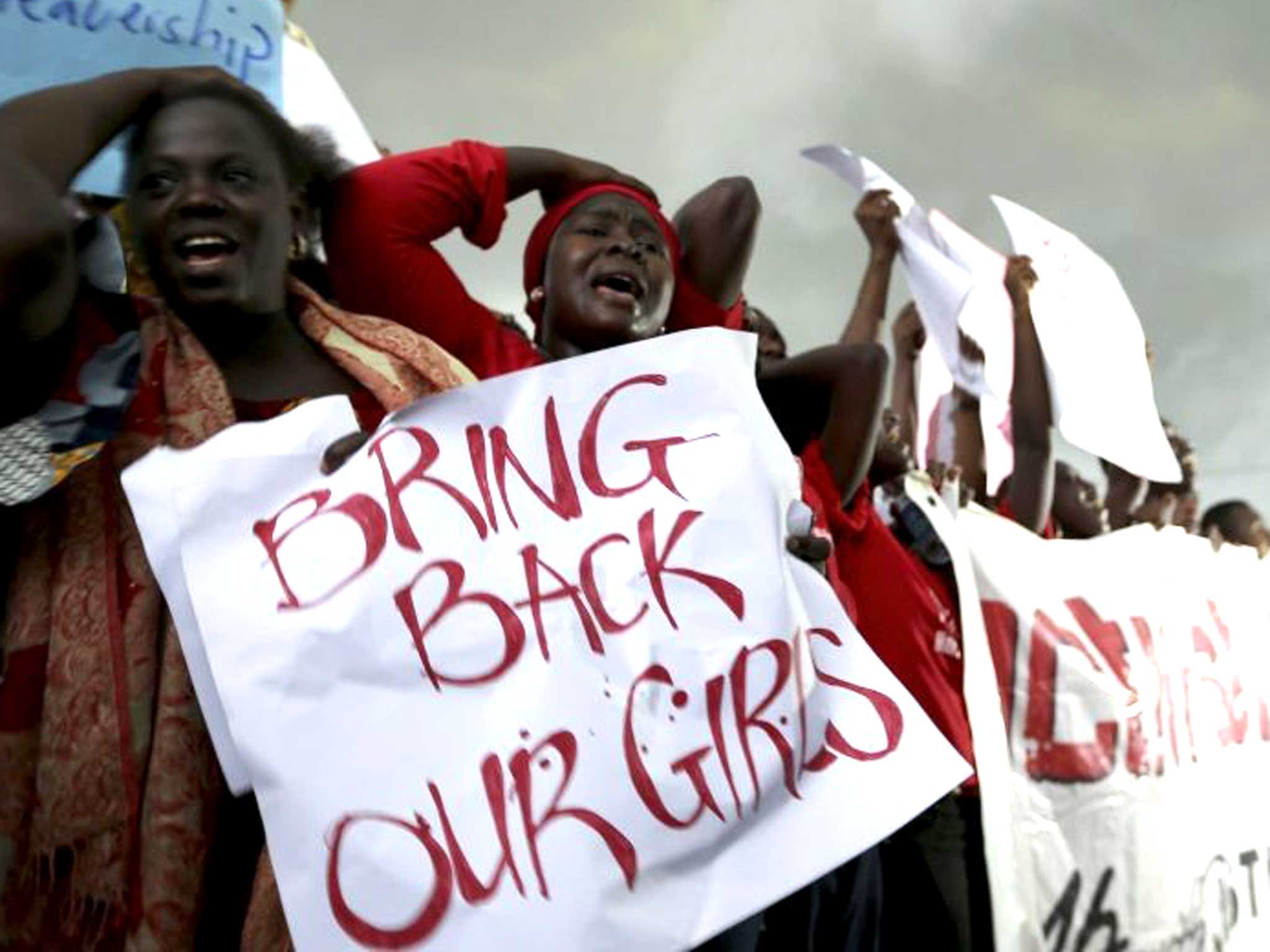Nigerian kidnapped schoolgirls: The world's media have failed in their response to the kidnap of 200 girls
Their abduction by terrorists has had little coverage compared with the missing Malaysian airliner

When members of the Islamist terror organisation Boko Haram abducted more than 200 schoolgirls from the town of Chibok in north-eastern Nigeria last month, they disguised themselves in military uniform. The girls, who knew that many schools in the state of Borno have been attacked by jihadists, initially believed that the unexpected visitors had come to take them to a safe place. But as they climbed reluctantly into trucks and on to motorcycles, the men began firing into the air and shouting "Allahu Akbar". Some of the girls decided to make a run for it, but the majority were coerced into travelling to a bush camp. There the terrorists forced them to cook for their captors.
To say that Boko Haram opposes gender equality is an understatement. The group's name is a Hausa phrase which translates as "Western education is sinful"; abducting teenage girls fulfils several of the group's aims, bringing the girls' education to an abrupt end and forcing them into traditional female roles. Of course Boko Haram doesn't just target girls; in February, it carried out a massacre at a rural boarding school in the neighbouring state of Yobe, where most of the 43 victims were boys. But it was clear from the outset that the kidnapped girls were at high risk of sexual violence, a point made by the British Foreign Secretary, William Hague, in one of his first statements about the abduction.
Last week, these fears appeared to have been well-founded when unconfirmed reports suggested that the girls had been taken out of Nigeria and were being forced to "marry" members of Boko Haram. It should not need pointing out that "marriage" in this context means domestic enslavement and mass rape. The former British prime minister Gordon Brown, who is now United Nations special envoy on education, observed that the girls' desperate families still do not know "whether they're about to be murdered or used as sex slaves".
Nigeria is one of three countries which have just announced their endorsement of a Declaration of Commitment to End Sexual Violence in Conflict, an initiative by the British government which has been signed by more than three-quarters of UN member states. So what are the Nigerian authorities doing about this egregious example of sexual violence within their own borders? When I spoke to the Foreign Office on Friday, a spokesman told me that Mr Hague had offered assistance to the Nigerian Minister for Foreign Affairs, Aminu Wali, two weeks earlier – and was still waiting for a response.
Almost three weeks after the girls were seized, there is mounting anger in Nigeria about the government's failure to locate and rescue them. Officials tried to play down the gravity of the incident, claiming that just over a hundred girls had been taken but latest figures suggest at least 223 remain missing. Fifty-three escaped but the military, which claimed to have rescued most of the teenagers, has had to admit its failure to retrieve a single one. Distraught relatives went into the forest armed with bows and arrows but were warned to turn back by local people, who said they stood no chance against the heavily armed jihadists.
"We don't know where they are up until now, and we have not heard anything from the government," the father of one of the girls told The New Yorker last week. He is one of the lucky ones: his daughter Deborah Sanya, 18, took one look at the terrorists' camp and realised that her only chance was to run and hide in the forest. She persuaded two of her friends to go with her and they managed to get to a nearby village. But her cousins and many of her friends are still missing.
On Friday morning's Radio 4 Today programme, the Nigerian Nobel laureate Wole Soyinka described the abduction as an "atrocity". Soyinka has been critical of the Nigerian government's response almost from the start, previously accusing the President, Goodluck Jonathan, of insensitivity towards the girls' plight. But it has to be said that it is not just the Nigerian government which is open to this charge. Where were the international television crews and big-name foreign correspondents when so many teenage girls were abducted? Without intense scrutiny from the world's media, a weak government fighting an undeclared war with well-armed terrorists was never likely to mount the kind of search and rescue operation demanded by such dire events.
Anyone who doubts the power of the world's media to affect the actions of governments should consider the very different response to the disappearance in March this year of a Malaysian airliner. The unsolved mystery of Flight MH370 is a tragedy for the relatives of those on board, and it now looks as if they may not discover what happened to their loved ones for months or years. But the missing plane remained at the top of the international news agenda for weeks, long after any realistic hope of finding survivors had faded. Politicians held daily press conferences, despite having next-to-nothing to report.
There is a very good chance, by contrast, that the Nigerian schoolgirls are still alive – and could be rescued. Mr Brown has called for international military assistance, including air support, and he's due to meet President Jonathan this week. But the sluggish response of the international media speaks volumes about the low priority afforded to violence against women and girls. Scouring thousands of miles of ocean for debris is much more appealing, it seems, than reporting on the abduction and probable enslavement of more than 200 female students.
Join our commenting forum
Join thought-provoking conversations, follow other Independent readers and see their replies
Comments
Bookmark popover
Removed from bookmarks